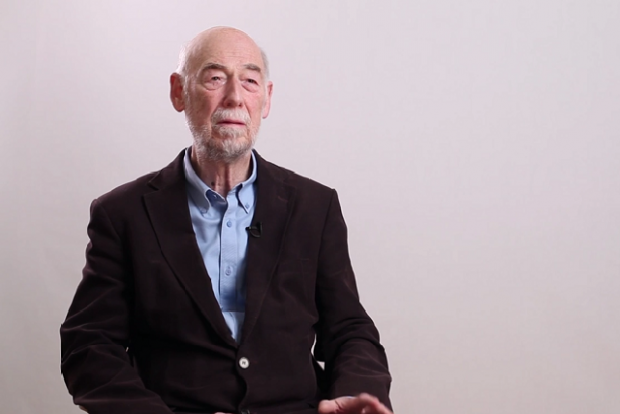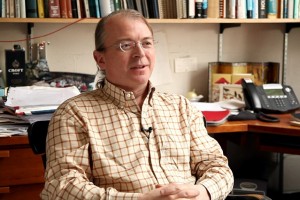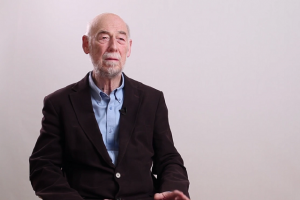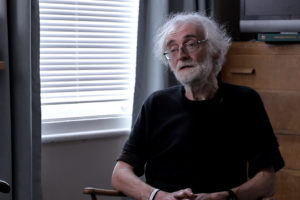Theorem of Human Unpredictability
MIT Professor Seth Lloyd on Gödel’s incompleteness theorems, the Cretan liar paradox, and the problem of free ...
How have paradoxes been used throughout history? How have paradoxes influenced the study of mathematics? In what ways do paradoxes challenge knowledge and truth? These and other questions are answered by Historian and Philosopher Stephen Read.
One way of thinking about logical paradoxes, it seems to me, is to start with a little story that Cervantes tells in his book ‘Don Quixote’. There’s a point in ‘Don Quixote’ where he leaves Sancho Panza as governor of Barataria and they play some tricks on him while he’s governor. They wake him up early in the morning and take him off and say, ‘Before breakfast you have to go and judge this case in the law court’. And you know, there’s a lot of vagabonds around in Spain in the moment, and you have to be careful about people. And there’s a landowner who had a river in the middle of his property, and there’s a bridge across the river, and to make sure that everyone is bonafide, he puts the gallows next to the brighe and a gatekeeper, bridgekeeper, who challenges everyone who comes to say what their buisness is and where they’re going. If they speak truly, they’re allowed to cross the bridge, but if they lie, then they hung on the gallows.
And that’s fine, it sorts out the vagabonds from the real merchants until one day someone comes along and says, ‘My purpose is to die on those gallows and nothing else’. And a bridgekeeper was a bit struck by this because they think, well, if we hang him, he’ll have spoken the truth, and so we should let him pass across the bridge, but if we let him pass across the bridge, he’ll have lied, and so we should’ve hang him. ‘So, Sancho Panza, how should we judge this case?’ And it takes a while for Sancho Panza to appreciate the paradox but eventually he gives his judgement which is to hang the half of him that lied and let the half of him that spoke the truth to cross the bridge.
There’s a whole variety of logical paradoxes like this, and you can see why it’s called logical paradox because there’s a logic behind working out the contradiction that’s involved. Some people would’ve heard of Epimenides. Epimenides was a Cretan, and he was very disappointed in his compatriots and their ability to tell the truth, and he said, ‘All Cretans are liars’. Now, if he was right that all Cretans were liars or other Cretans always lied, then his own utterance must be paradoxical, because if he says ‘All Cretans are liars’, he’s saying that his own utterance in particular is false, but that means that all Cretans were liars, in which case he was telling the truth when he said that all Cretans were liars. The way out, of course, is that some other Cretans sometime spoke the truth and what he said would be simply false and not paradoxical.
So we have this whole variety of paradoxes. There’s a quite nice paradox that I enjoy: there is a postcard here, and on one side of the postcard it says ‘The sentence on the other side of this postcard is true’, and you turn it over, and it says ‘The sentence on the other side of this postcard is false’. And if you think about it, that’s simply paradoxical, because if the sentence on the first side is true, then one on the other side is true because it says is true, but it says it’s false. So if it’s true, it’s false, but that’s impossible, so that must be false. But it says that the sentence on the other side is false, so it can’t be false, so one on the other side must be true. But we saw that when it said it was true, it was false, and so we have a neat paradox.
A number of medieval thinkers who thought about this rather like to put this in terms of Socrates and Plato, or Plato and Aristotle sometimes. So Plato was Aristotle’s teacher and thought that Aristotle was his best pupil, so he said ‘Everything Aristotle says is true’. But Aristotle wasn’t a very good pupil in a way that he wanted to challenge Plato’s doctrine, so he said ‘What Plato says is false’, and it’s very like the postcard paradox that you get with the Plato and Aristotle paradox.
So we’ve got a lot of paradoxes in that area around truth and lying and language but in the 20th century we were faced with a number of paradoxes in mathematics.
The brief history of that is that following the invention of the calculus and then in the 18th century dealing with infinite series, the foundations of mathematics were thought to be rather insecure, people wanted to say, ‘How do these series work so that they don’t lead us to contradictions in mathematics?’. There’s a big movement in the 19th century to try and find a firm foundation for mathematics. That firm foundation at the time ended up being based on the theory of sets. So sets are collections where you define a collection by having some property: you say, let’s take the set of all natural numbers or set of even numbers or we might take a set of rice puddings – lots of sets. For the mathematics, of course, it got to be pure sets of numbers.
And that looked very good at the end of the 19th century. Frege, Dedekind and number of other thinkers had established mathematics or what seemed like a firm foundation of the theory of sets. And then Bertrand Russell (who was a famous British philosopher) when he was reading Frege’s works he looked at this theory that Frege had and he thought, ‘You could have a set of numbers, you could have a set of sets, you could have a set of sets that are members of themselves, you can have a set of sets that are not the members of themselves’, and then he thought, ‘Hang on, if you have a set of sets that weren’t members of themselves, would that set be a member of itself or not?’ Well, if it was a member of itself, then it shouldn’t be a member of itself because it was supposed to be a set of sets that aren’t members of themselves, so it’d better not be a member of itself. But if it isn’t a member of itself, then it’s a set that’s not a member of itself, so it should be a member of this set.
They look like party tricks to start with but now we’ve got a paradox and a contradiction right at the heart of what was thought to be the foundation of mathematics in the early 20th century.
And this was a great blow to Frege famously, Frege was about to publish volume two of his great work of ‘Foundations’, and he had to put an appendix saying, ‘Bertrand Russell has pointed out this flaw right in the heart of my theory, I think I can solve it’, and he suggested a solution, but it wasn’t in fact a viable solution as it turned out.
I’ll talk a little bit about paradoxes in set theory because there’s another paradox which is actually rather entertaining and leads us back to talking about the paradoxes of truth or so-called semantic paradoxes. So about 40 years later, around about 1940 a man called Haskell B. Carry, an American logician, mathematical logician was thinking about Russell’s Paradox and he said, well, right at the heart of paradox that Russell has is negation, he’s talking about the set of all sets that are not members of themselves, and I wonder if you can actually get this paradox to work even without using negation? Is there a way we can do that? And he thought, yes, there is a way of doing it, let’s think of set of all sets, that if they’re members of themselves, then naught equals one. That’s again according to the theory of sets that looks like a viable set. But now if we think about this set, if it was a member of itself, then it would be such that it would satisfy the condition that if it is a member of itself, then naught equals one. But we’ve assumed that it is a member of itself, so it follows that naught equals one. And it seems fairly obvious that naught can’t equal one, so we’re backtrack and say it can’t be member of itself. Well, if it’s not a member of itself, then immediately follows that either it’s not a member of itself or naught equals one. But that’s the same as saying if it’s a member of itself, a naught does equal one, that’s the same to say either it’s not a member of itself or naught equals one, it’s to say, if it is a member of itself, it is not the case that it’s not a member of itself, then naught equals one. But now it satisfies a condition to be a member of itself, so we’ve proved that it is a member of itself. But now having shown that it’s a member of itself, it follows that it satisfies the condition that if it’s a member of itself, then naught equals one.
Help! We’ve proved that naught equals one! And so we have a real horrible contradiction and paradox right at the heart of mathematics again.
And a few years later people translated that paradox back into the semantic paradoxes that I was talking about earlier, and then we put it into the form of the sentence that says, ‘If the sentence is true then naught equals one’ or even ‘If the sentence is true then God exists’. And then we can give a proof in just a few lines that God exists or anything else we like to take: naught equals one, God exists, today it’s raining in Moscow, we can prove anything we like with such a sentence. People think about truth, so it is very dangerous, you know, is truth really like that? Is truth an inconsistent concept?
And I’ll finish up by talking briefly about the knower paradox just to show that these paradoxes ramify a bit further than that. So now I think about the sentence ‘You do not know this proposition’, that this proposition I’m saying, you do not know it. Now suppose you do know it. Well, you can only know things that are true, so if you know it then it’s true, in which case you don’t know it, because that’s what it says. So if you assume that you know it, it follows that you don’t know it. But now let’s think about we’ve proved you don’t know it, but it said you don’t know it, that’s what it said, so we’ve proved it. And surely if we prove something, we’ve proved something is true, then we do know it, we’ve got a prove of it. And so we’ve actually proved that you do know this proposition as well as the fact that you don’t know this proposition, so we have an epistemic paradox.

So briefly to sum up, I’ve described a number of semantic paradoxes, mostly to do with truth, I’ve been showing that they are very similar to some set-theoretic paradoxes at the heart of the foundations of mathematics. And actually there are also epistemic paradoxes which apply to concepts like knowledge as well as concept like truth. To sum up what I’ve been saying, I mean I’ve been describing a number of semantic paradoxes like the liar paradox and Epimenides paradox and that postcard paradox that apply to the concept of truth (we’re talking about lying and truth and falsehood and so on) and then I’ve described a number of set-theoretic paradoxes which arise in mathematics. And then at the end I just discussed also the knower paradox, epistemic paradoxes.
What you can immediately see I think how it’s important that we find some solution to them as far as mathematics is concerned, because we were looking for a basics of mathematics that was firm and sound, that would make sure we didn’t make any mistakes in mathematics, and we have contradiction right at the heart of the foundations. So we certainly need a solution as long as mathematical ones are concerned, the set-theoretical ones, but also in terms of the semantic paradoxes. The concept of truth is something that philosophers think about, they want to give an account of the nature of truth. What is it for a proposition to be true? The natural thought is that proposition is true just if things are as it says they are; well, look at the liar paradox: ‘that’s true if I’m lying’, well, that’s immediately paradoxical and leads to contradiction. So we need to rethink the concept of truth, some people want to rethink the logic that lay behind it and the methods of reasoning that we used to get a contradiction. And it’s important that we do that if we are to get a proper understanding of the concepts of truth and knowledge.

MIT Professor Seth Lloyd on Gödel’s incompleteness theorems, the Cretan liar paradox, and the problem of free ...

Historian and Philosopher of Logic Stephen Read on the history of paradoxes, semantic paradoxes, and its direc...

Mathematician Gareth Jones on number theory, why there are infinitely many of prime numbers and how to calcula...